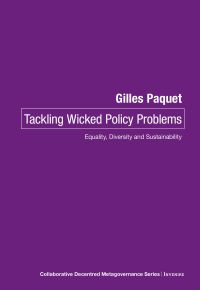Tackling Wicked Policy Problems
Éditeur : Les Presses de l'Université d'Ottawa
ISBN numérique PDF: 9780776638652
Parution : 2022
Catégorisation :
Livres numériques /
Autre /
Autre /
Autre.
Formats disponibles
| Format | Qté. disp. | Prix* | Commander |
|---|---|---|---|
| Numérique PDF Protection none*** |
Illimité | Prix : 16,95 $ |
*Les prix sont en dollars canadien. Taxes et frais de livraison en sus.
***Ce produit est protégé en vertu des droits d'auteurs.
Description
This short book contributes to accelerating the process of recognition of governance studies as a heuristically powerful field of study in two distinct ways. In Part I, it shows first how the governance approach has emerged in response to the limitations of the two main cosmologies that have dominated the 20th century scene type-I liberalism rooted in the market and decentralization; and type-II liberalism rooted in statism and centralization. It proposes a better way to respond effectively to the challenges of effective coordination when power, resources and information are widely distributed into many hands and heads. This new approach has been criticized by the defenders of the ruling cosmologies, but it has evolved effective prototypes of inquiring systems capable of guiding the search for effective wayfinding and for the design of organizational arrangements ensuring effectiveness, resilience and innovation. In Part II, it explores how the governance approach may help in tackling wicked policy problems where ends are neither well known nor agreed upon, and means-ends relationships are either poorly understood or unstable. Three somewhat different cases are discussed: equality where a dominant ideology of egalitarianism in democratic societies is challenged with great difficulty by a cosmology of equability; diversity where, in Canada, maximum diversity would appear to be regarded as optimal diversity, and multiculturalism is propagandized as the nec plus ultra response even though it may be shown to be toxic; and sustainability, where the problem definition and the general direction in which a viable organizational learning regime will emerge are unclear. On both fronts, the book tries to bring a bit of subtlety, a taste for complexity, and some innovative ideas to debates that have wallowed, both at the conceptual and at the practical levels, in ideologically muddy waters.This short book contributes to accelerating the process of recognition of governance studies as a heuristically powerful field of study in two distinct ways. In Part I, it shows first how the governance approach has emerged in response to the limitations of the two main cosmologies that have dominated the 20th century scene type-I liberalism rooted in the market and decentralization; and type-II liberalism rooted in statism and centralization. It proposes a better way to respond effectively to the challenges of effective coordination when power, resources and information are widely distributed into many hands and heads. This new approach has been criticized by the defenders of the ruling cosmologies, but it has evolved effective prototypes of inquiring systems capable of guiding the search for effective wayfinding and for the design of organizational arrangements ensuring effectiveness, resilience and innovation. In Part II, it explores how the governance approach may help in tackling wicked policy problems where ends are neither well known nor agreed upon, and means-ends relationships are either poorly understood or unstable. Three somewhat different cases are discussed: equality where a dominant ideology of egalitarianism in democratic societies is challenged with great difficulty by a cosmology of equability; diversity where, in Canada, maximum diversity would appear to be regarded as optimal diversity, and multiculturalism is propagandized as the nec plus ultra response even though it may be shown to be toxic; and sustainability, where the problem definition and the general direction in which a viable organizational learning regime will emerge are unclear. On both fronts, the book tries to bring a bit of subtlety, a taste for complexity, and some innovative ideas to debates that have wallowed, both at the conceptual and at the practical levels, in ideologically muddy waters.
Du même auteur...
| Livre papier | 1 | Prix : 16,95 $ |

Gouvernance corporative
Éditeur : Les Presses de l'Université d'Ottawa
ISBN : 9782760339071
Parution : 2022
| Livre papier | 1 | Prix : 16,95 $ |

Gouvernance corporative
Éditeur : Les Presses de l'Université d'Ottawa
ISBN : 9782760339088
Parution : 2022
| Livre papier | 1 | Prix : 15,95 $ |

Moderato Cantabile
Éditeur : Les Presses de l'Université d'Ottawa
ISBN : 9780776638478
Parution : 2022























